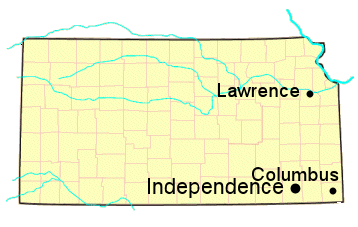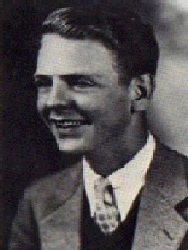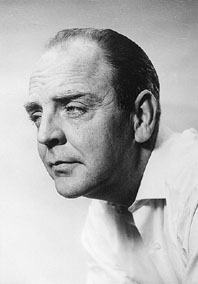
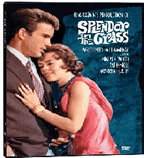
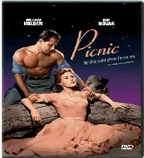
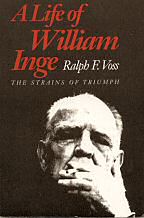
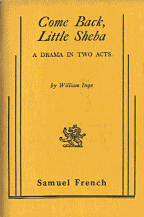
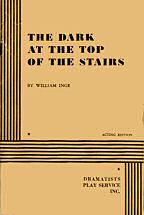
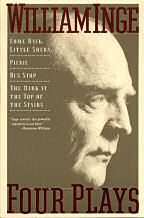
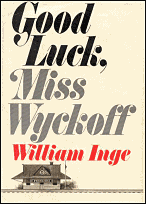
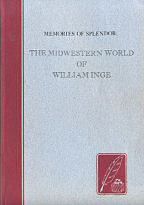
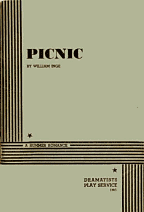
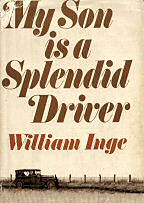
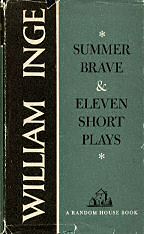
|
| Biography |
|
| |
William Motter Inge was born at Independence, Kansas, on May 3, 1913. He was the youngest of the five children of a small-town merchant and traveling salesman. As a child, he recited poems in public, kept a scrapbook of movie stars and acted in school plays. At the age of seventeen, in 1930, Inge went to the University of Kansas, Lawrence, where he graduated in 1935. He spent longer than the usual four years there because he took off one year to travel with a tent theater company. From K.U., Inge went to the George Peabody Teacher's College in Nashville, Tennessee, where he had a scholarship. He soon dropped out of Peabody and returned to Kansas, odd-jobbing as a laborer with a highway gang, as an announcer for a Wichita radio station, and as a radio writer. In 1937, he taught high school at Columbus, Kansas, and then returned in 1938 to Peabody to complete his M.A. From his graduation until 1943, Inge taught at Stephens kCollege in Columbia, Missouri. He was becoming more involved with the theatre (he was drama critic for the St. Louis Star-Times from 1943-1946) when he took another teaching post, this time at Washington College in St. Louis. During his stay in St. Louis, he saw Tennessee William's The Glass Menagerie and decided that he should write plays himself. He met Williams and found encouragement.
Inge's first plays, written in the mid-1940s, were performed by a little theater in Dallas, Texas. His The Dark at the Top of the Stairs was originally titled Farther Off from Heaven and is dedicated to Tennessee Williams. His first hit play was Come Back, Little Sheba. Performed on Broadway in 1950, it won the George Nathan Award and the Theater Time Award. It was followed by Picnic (1953), which won the Pulitzer, the Drama Critic's Award and the Outer Circle Award. Bus Stop, in 1955, was another big success, as was The Dark at the Top of the Stairs, which opened on Broadway in 1957.
His 1959 play, A Loss of Roses, was not well received, and it started a downhill slide for Inge that was relieved only by his winning the Academy Award for the original story and screenplay of Splendor in the Grass in 1961. After a series of his plays were panned by the critics, Inge began teaching again. He also explored the novel, writing My Son is a Splendid Driver (1971) and Good Luck, Miss Wyckoff (1970). In 1973, reportedly discouraged and depressed, Inge committed suicide on June 10, at Irvine, California. Return to Top
of Page |
|
|
Bibliography ( - housed in Thomas Fox Averill Kansas Studies Collection) - housed in Thomas Fox Averill Kansas Studies Collection) |
|
|
Plays:
- The Last Pad (1970)
- Where's Daddy? (Random House, 1966)
- Natural Affection (Random House, 1963)
 Summer Brave & Eleven Short Plays (Random House, 1962) Summer Brave & Eleven Short Plays (Random House, 1962)
- To Bobolink, for Her Spirit (1962)
- The Boy in the Basement (1962)
- Bus Riley's Back in Town (1962)
- A Loss of Roses (Random House, 1960)
- Glory in the Flower (Broadway Books, 1958)
 Four Plays (Grove Press, 1958) Four Plays (Grove Press, 1958)
 The Dark at the Top of the Stairs (Dramatists Play Service, 1957) The Dark at the Top of the Stairs (Dramatists Play Service, 1957)
- Bus Stop (Dramatists Play Service, 1955)
 Picnic (Dramatists Play Service, 1953) Picnic (Dramatists Play Service, 1953)
 Come Back, Little Sheba (Samual French, Inc., 1950) Come Back, Little Sheba (Samual French, Inc., 1950)
- Farther Off from Heaven (1947)
Novels:
Books about William Inge:
Return to Top
of Page
|
|
|
| Writing
Samples |
|
| |
Picnic
Madge: Whenever I hear that train coming to town, I always get a little feeling of excitement--in here. (Hugging her stomach)
Millie: Whenever I hear it, I tell myself I'm going to get on it some day and go to New York.
Flo: That train just goes as far as Tulsa.
Millie: In Tulsa I could catch another train.
Madge: I always wonder, maybe some wonderful person is getting off here, just by accident, and he'll come into the dime store for something and see me behind the counter, and he'll study me very strangely and then decide I'm just the person they're looking for in Washington for an important job in the Espionage Department. (She is carried away) Or maybe he wants me for some great medical experiment that'll save the whole human race.
Flo: Things like that don't happen in dime stores. (Changing the subject) Millie, would you take the milk inside?
The Dark at the Top of the Stairs
Cora: I never supposed you had it in you to fear.
Rubin: I s'pose all this time you been thinkin' you was married to one a them movin'-pitcher fellas that jump off bridges and hold up trains and shoot Indians, and are never scared a nothin'. Times are changin', Cora, and I dunno where they're goin'. When I was a boy, there wasn't much more to this town than a post office. I on'y had six years a schoolin' cause that's all the Old Man thought I'd ever need. Now loook at things. School buildin's, churches, fine stores, movie theatres, a country club. Men becomin' millionaires overnight, drivin' down the street in big limousines, goin' out to the country club and gettin' drunk, acting like they was the lords of creation. I dunno what to think of things now, Cora. I'm a stranger in the very land I was born in.
Cora: (Trying to restore his pride) Your folks pioneered this country.
Rubin: Sometimes I wonder if it's not a lot easier to pioneer a country than it is to settle down in it.
My Son is a Splendid Driver
I had always been a good driver, maybe as good as Jule had been, even though I had no craving for speed or to drive in races or pilot an airplaine. Yet, I always drove with a steady rhythm and good reflexive actions. I enjoyed driving on those summer evenings, just to relax and feel the breeze stirred up by the car's movement; and I enjoyed, too, the feeling of driving to reach a destination, the tranquilization of one's energies all being united to reach one goal. Yet, Mother had created in her mind a legend of Jule's driving that she liked to romanticize in her memory, and she never allowed anyone to rival him. And so I grew up with the knowledge that it was pointless for me to compete with her memory of Jule. Anything I attempted that Jule had ever done was certain to appear commonplace in Mother's judgment. She felt she owed him this peeless seat in her memory.
Return to Top of Page |
|
|
| Other |
|
| |
The most important celebration of William Inge's life and work takes place every spring in Independence, Kansas. For information, please visit:
http://www.ingefestival.org/
Other websites of interest:
New York Public Library blog about Inge's relationship with actress Barbara Baxley.
http://www.nndb.com/people/114/000113772/
http://www.imdb.com/name/nm0408718/
http://en.wikipedia.org/wiki/William_Inge
About Inge from Averill program, February 26, 1980, Independence Communtiy College.
Article about Slplendor in the Grass (Film) from The New Yorker, 1980
Return to Top of Page |
|
|
|

